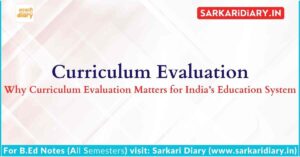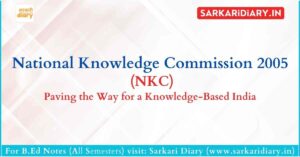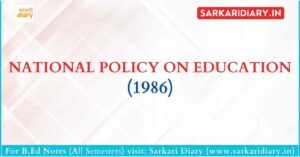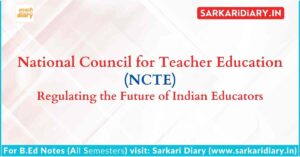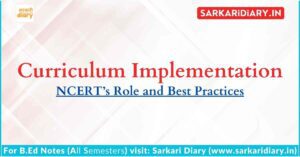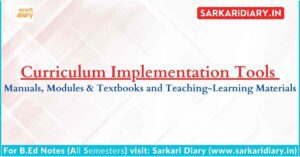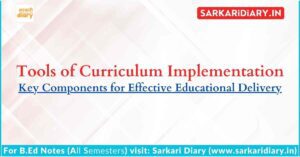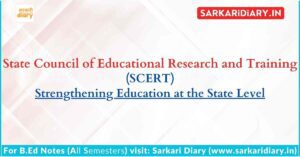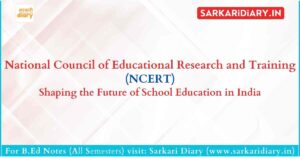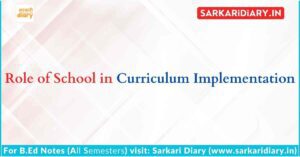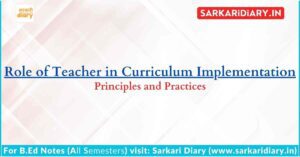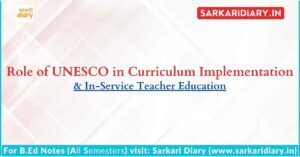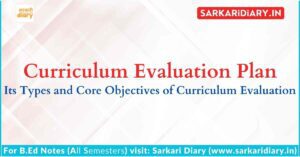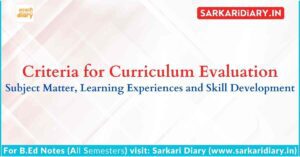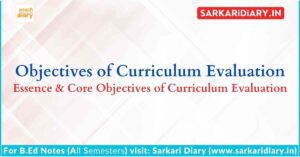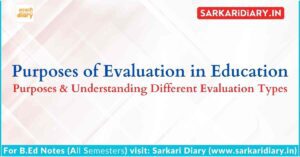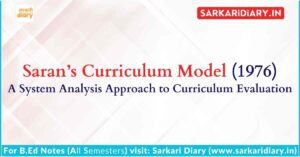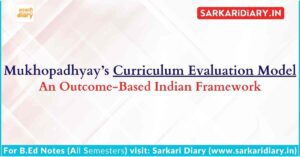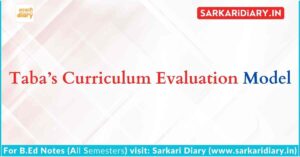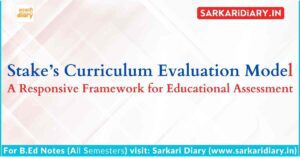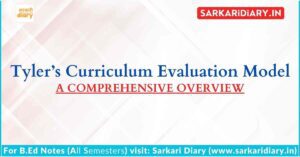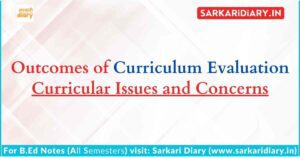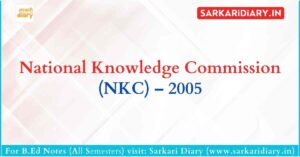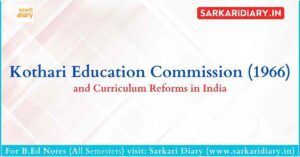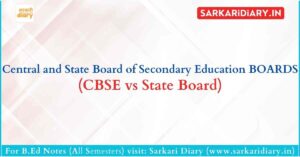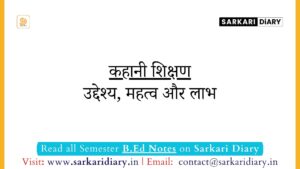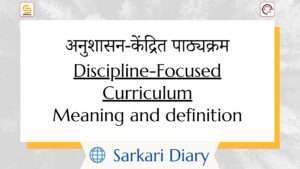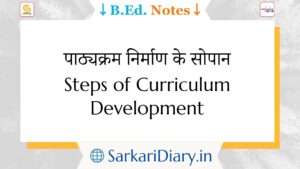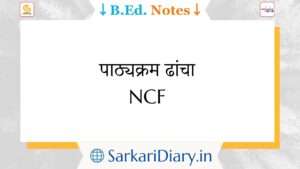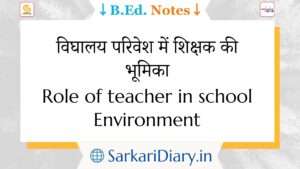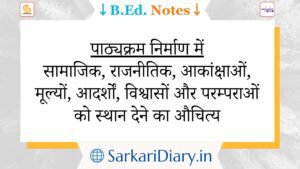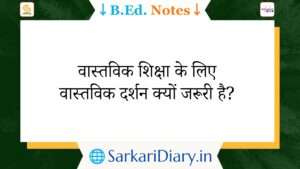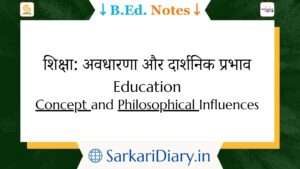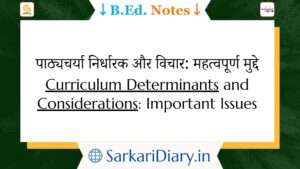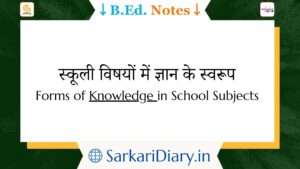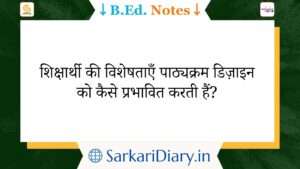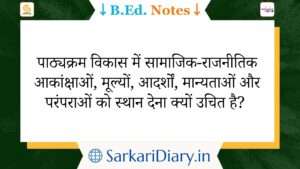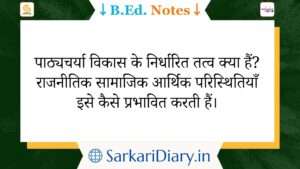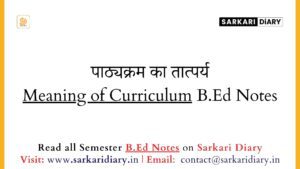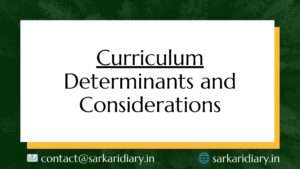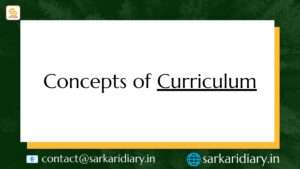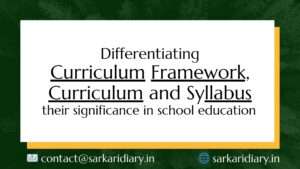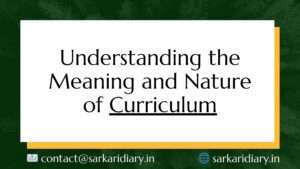Knowledge and Curriculum B.Ed Notes
B.Ed Study Notes by Sarkari Diary
Welcome to Sarkari Diary, your favorite website for B.Ed Notes on Knowledge and Curriculum. In this section, we provide comprehensive study material and resources to help B.Ed students understand the knowledge and Curriculum (concepts of the course).
याद रखें, ज्ञान और पाठ्यक्रम (Knowledge and Curriculum) शिक्षा के मूलभूत स्तंभ हैं। इन विषयों पर हमारे बी.एड नोट्स का अध्ययन करके, आपको यह समझने में एक ठोस आधार मिलेगा कि ज्ञान कैसे प्राप्त किया जाता है और पाठ्यक्रम कैसे डिज़ाइन और कार्यान्वित किए जाते हैं।
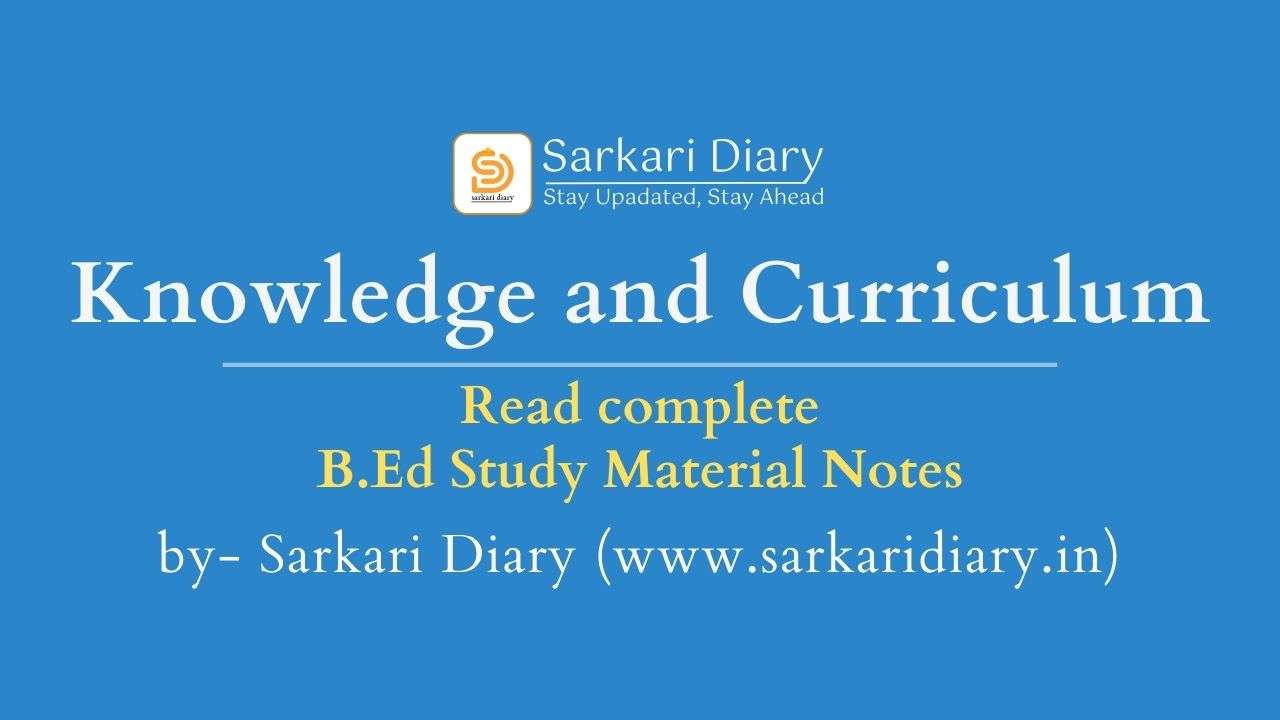
- National Education Policy 2020 (NEP)→ Important Terms and Their Full Forms
- Understanding Evaluation and Curriculum Evaluation
- National Knowledge Commission (NKC) 2005: Paving the Way for a Knowledge-Based India
- NATIONAL POLICY ON EDUCATION (1986)
- University Grants Commission (UGC): Pillar of Higher Education in India
- National Council for Teacher Education (NCTE): Regulating the Future of Indian Educators
- Curriculum Implementation: NCERT’s Role and Best Practices
- Curriculum Implementation Tools – Manuals, Modules & Textbooks and Teaching-Learning Materials
- Tools of Curriculum Implementation: Key Components for Effective Educational Delivery
- State Council of Educational Research and Training (SCERT): Strengthening Education at the State Level
- National Council of Educational Research and Training (NCERT): Shaping the Future of School Education in India
- Role of School in Curriculum Implementation
- Role of Teacher in Curriculum Implementation: Principles and Practices
- Role of UNESCO in Curriculum Implementation and In-Service Teacher Education
- Curriculum Evaluation: Why Curriculum Evaluation Matters for India’s Education System
- Curriculum Evaluation Plan – Its Types and Core Objectives of Curriculum Evaluation
- Criteria for Curriculum Evaluation: Subject Matter, Learning Experiences and Skill Development
- Objectives of Curriculum Evaluation: Essence & Core Objectives of Curriculum Evaluation
- Purposes of Evaluation in Education: Purposes & Understanding Different Evaluation Types
- Saran’s Curriculum Model (1976): A System Analysis Approach to Curriculum Evaluation
- Mukhopadhyay’s Curriculum Evaluation Model: An Outcome-Based Indian Framework
- Taba’s Curriculum Evaluation Model: A Progressive Approach to Democratic Learning
- Stake’s Curriculum Evaluation Model: A Responsive Framework for Educational Assessment
- Tyler’s Curriculum Evaluation Model: A Comprehensive Overview
- Outcomes of Curriculum Evaluation & Curricular Issues and Concerns
- Models of Teaching
- Maxims / Principles of Teaching
- Agencies of Curriculum Change – UGC, NCERT & SCERT
- Process of Curriculum Change: Strategies & Requirements for Curriculum Change
- Factors Influencing Curriculum Change
- Objectives of Curriculum Change: Nature & Categories of Curriculum Change
- CHANGING PARADIGMS IN EDUCATION – NEED FOR CURRICULUM CHANGE
- National Knowledge Commission (NKC) – 2005
- National Policy on Education (1986): Revised Overview of the NEP 1986
- National Curriculum and Education Reforms in India: A Comprehensive Overview
- Kothari Education Commission (1966) and Curriculum Reforms in India
- Secondary Education Commission (1953): Curriculum Recommendations
- Principles of Curriculum Construction: A Comprehensive Guide
- Curriculum Reforms in India: Evolution, Principles and Impact
- Role of Textbooks in Curriculum: Understanding Their Importance in Indian Education
- Central and State Boards of Secondary Education in India: Complete Guide
- Central and State Board of Secondary Education BOARDS (CBSE vs State Board)
- Higher Secondary Level Curriculum (Classes XI–XII)
- Upper Primary & Secondary Curriculum Areas
- Art of Healthy and Productive Living
- Different Stages of Specific Curriculum
- Principles of the Curriculum Framework
- Curriculum Framework: Significance & Common Elements of a Curriculum Framework
- Theory of Curriculum
- Curriculum Organization | B.Ed Notes
- Null (Excluded) Curriculum | B.Ed Notes
- Hidden (Latent) Curriculum | B.Ed Notes
- Core Curriculum: Objectives & Characteristics
- Problem-Centered Curriculum | B.Ed Notes
- Learner-Centered Curriculum | B.Ed Notes
- Types of Curriculum | B.Ed Notes
- Need and Importance of Curriculum Development | B.Ed Notes
- Basic Principles of Curriculum | B.Ed Notes
- Curriculum Development | B.Ed Notes
- Different Methods for Curriculum Construction | B.Ed Notes
- शिक्षा की आधारशिलाएँ (Foundations of Education) B.Ed Notes
- ज्ञान की उत्पत्ति (Genesis of Knowledge) B.Ed Notes
- ज्ञान के प्रकार (Types of Knowledge) B.Ed Notes
- ज्ञान की संरचना और स्वरूप (Structure and Forms of Knowledge) B.Ed Notes
- सूचना का अर्थ (Meaning of Information) B.Ed Notes
- कहानी शिक्षण: उद्देश्य, महत्व और लाभ [Storytelling in Education]
- तर्क से आप क्या समझते हैं? B.Ed Notes
- अनुशासन-केंद्रित पाठ्यचर्या: परिभाषा और अर्थ | Discipline-focused curriculum B.Ed Notes
- अनुशासन-केंद्रित पाठ्यक्रम: अर्थ एवं परिभाषा | Discipline-focused curriculum B.Ed Notes
- पाठ्यक्रम निर्माण के सोपान | Steps of Curriculum Development B.Ed Notes
- पाठ्यक्रम ढांचा | NCF B.Ed Notes
- विघालय परिवेश में शिक्षक की भूमिका B.Ed Notes
- पाठ्यक्रम निर्माण में सामाजिक, राजनीतिक, आकांक्षाओं, मूल्यों, आदर्शों, विश्वासों और परम्पराओं को स्थान देने का औचित्य B.Ed Notes
- वास्तविक शिक्षा के लिए वास्तविक दर्शन क्यों जरूरी है?
- शिक्षा: अवधारणा और दार्शनिक प्रभाव | Education: Concept and Philosophical Influences B.Ed Notes
- पाठ्यचर्या निर्धारक और विचार: महत्वपूर्ण मुद्दे | Curriculum Determinants and Considerations B.Ed Notes
- स्कूली विषयों में ज्ञान के स्वरूप | Forms of Knowledge in School Subjects B.Ed Notes
- शिक्षार्थी की विशेषताएँ पाठ्यक्रम डिज़ाइन को कैसे प्रभावित करती हैं? | B.Ed Notes in Hindi
- पाठ्यक्रम में सामाजिक – राजनीतिक आयाम | B.Ed Notes in Hindi
- पाठ्यचर्या विकास के निर्धारित तत्व क्या हैं? राजनीतिक सामाजिक आर्थिक परिस्थितियाँ इसे कैसे प्रभावित करती हैं | B.Ed Notes in Hindi
- पाठ्यक्रम का तात्पर्य [Meaning of Curriculum]
- Meaning and Values of Information B.Ed Notes
- Structure and Forms of Knowledge B.Ed Notes
- Foundations of Curriculum B.Ed Notes
- Modes of Education: Formal, Informal and Distance Education B.Ed Notes
- Teaching in Multi-Cultural Settings B.Ed Notes
- Curriculum Development B.Ed Notes
- Curriculum and Syllabus B.Ed Notes
- Need and Importance of Curriculum B.Ed Notes
- Curriculum: Meaning, Nature and Scope of Curriculum B.Ed Notes
- Types of Knowledge: Personal, Procedural and Propositional knowledge B.Ed Notes
- Discipline-Focused Curriculum: Meaning and Definition B.Ed Notes
- शिक्षा: अवधारणा और दार्शनिक प्रभाव B.Ed Notes
- पाठ्यचर्या निर्धारक और विचार: महत्वपूर्ण मुद्दे | Curriculum Determinants and Considerations B.Ed Notes
- स्कूली विषयों में ज्ञान के स्वरूप | Forms of Knowledge in School Subjects B.Ed Notes
- Curriculum Determinants and Considerations B.Ed Notes
- Concepts of Curriculum B.Ed Notes
- Differentiating Curriculum Framework, Curriculum and Syllabus; their significance in school education (B.Ed) Notes
- Meaning and Nature of Curriculum: Need for Curriculum in Schools B.Ed Notes
| SYLLABUS FOR TWO-YEAR B.Ed. Semester 2 (PAPER 6) | ||
| क्र• सं• | UNIT NAME | DETAILS |
| 1 | Epistemological contribution of educational thinkers | What is education, concept meaning relationship with philosophy Epistemological analysis of following educational thinkers Western Educators-Plato, Rousseau, R S Peter Indian Thinkers-Swami Vivekanand, M K Gandhi, R N Tagore, Aurobindo Ghosh, Vinoba Bhave |
| 2 | Evolving knowledge base in education | Nature of knowledge in education: concepts, statements, educational view points, metaphors and theories, emerging k base in education difference between information, knowledge, belief, and opinion interfaces with cognate disciplines such as physical, natural and social sciences Concepts of curriculum Understanding the meaning and nature of curriculum: need for curriculum in schools. Differentiating curriculum framework, curriculum and syllabus; their significance in school educations Nation of the textbook |
| 3 | Curriculum determinants and considerations | Board determinants of curriculum making (at the nation or state-wide level) Considerations in curriculum development: (at the level of the school) |
Aims of the course- The courses intends to inform student-teachers that how knowledge and curriculum – making plays a critical role in a heterogeneous and plural society like India. However, without a clear vision and understanding of curricular aims, schools tend to become rigid in their curricular practices, and uniformly imposed processes, meanings, and values. This negates the ideals that they are expected to actualise. Therefore, the couses aims at enthusing student-teachers to infuse dynamism in selection of knowledge, symbols and values and child-friendly in pedagogy, student teachers understand the evolving meanings of ‘curriculum’. When seen as a dynamic process within this board field, conceptual linkages (and distinctions) between educational aims, curriculum framework, role of school organization and culture, as well as of the teacher, in operationalizing and developing a contextually responsive ‘curriculum’ and ‘critical pedagogy’
Knowledge and Curriculum B.Ed Notes
Sarkari Diary’s comprehensive B.Ed notes on Knowledge and Curriculum cover all the important topics in the B.Ed syllabus, including:
- What is knowledge?
- Different types of knowledge
- The importance of knowledge in education
- The concept of curriculum
- Factors that influence curriculum development
- Types of curriculum
- Approaches to curriculum design
- Evaluation of curriculum
Our B.Ed notes are easy to understand and informative, making them ideal for students who are preparing for the B.Ed entrance exam or who are simply looking to learn more about Knowledge and Curriculum.
Call to action:
Visit Sarkari Diary today to download your FREE copy of our B.Ed notes on Knowledge and Curriculum.

